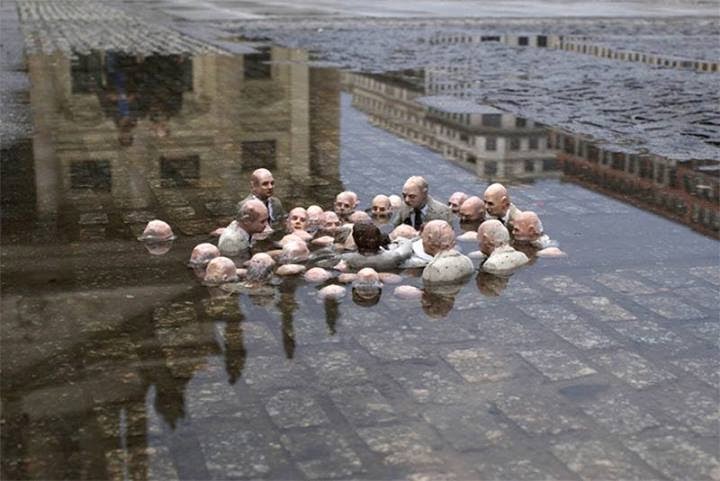Long article on the Guardian by Naomi Klein on climate change, the lack of inaction after so many years, the denial by many countries and the lack of binding commitment by the ones polluting the most, the disastreous dangers and catastrophes we will experience, and so on: Much more at the link.
http://www.theguardian.com/environment/2015/mar/06/dont-look-away-now-the-climate-crisis-needs-you
We know that if we continue on our current path of allowing emissions to rise year after year, climate change will change everything about our world. Major cities will very likely drown, ancient cultures will be swallowed by the seas, and there is a very high chance that our children will spend a great deal of their lives fleeing and recovering from vicious storms and extreme droughts. And we dont have to do anything to bring about this future. All we have to do is nothing. Just continue to do what we are doing now, whether its counting on a techno-fix or tending to our gardens or telling ourselves were unfortunately too busy to deal with it.
All we have to do is not react as if this is a full-blown crisis. All we have to do is keep on denying how frightened we actually are. And then, bit by bit, we will have arrived at the place we most fear, the thing from which we have been averting our eyes. No additional effort required.
There are ways of preventing this grim future, or at least making it a lot less dire. But the catch is that these also involve changing everything. For us high consumers, it involves changing how we live, how our economies function, even the stories we tell about our place on earth. The good news is that many of these changes are distinctly uncatastrophic. Many are downright exciting. But I didnt discover this for a long while.
The worlds governments have been talking about preventing climate change for more than two decades; they began negotiating the year that Anjali, then 21 years old, was born. And yet as she pointed out in her memorable speech on the convention floor, delivered on behalf of all of the assembled young people: In that time, youve failed to meet pledges, youve missed targets, and youve broken promises. In truth, the intergovernmental body entrusted to prevent dangerous levels of climate change has not only failed to make progress over its 20-odd years of work (and almost 100 official negotiation meetings since the agreement was adopted), it has overseen a process of virtually uninterrupted backsliding. Our governments wasted years fudging numbers and squabbling over start dates, perpetually trying to get extensions like undergrads with late term papers.
The catastrophic result of all this obfuscation and procrastination is now undeniable. In 2013, global carbon dioxide emissions were 61% higher than they were in 1990, when negotiations toward a climate treaty began in earnest. Indeed the only thing rising faster than our emissions is the output of words pledging to lower them. Meanwhile, the annual UN climate summit, which remains the best hope for a political breakthrough on climate action, has started to seem less like a forum for serious negotiation than a very costly and high-carbon group therapy session, a place for the representatives of the most vulnerable countries in the world to vent their grief and rage while low-level representatives of the nations largely responsible for their tragedies stare at their shoes.
In Copenhagen, the major polluting governments including the US and China signed a nonbinding agreement pledging to keep temperatures from increasing more than 2C above where they were before we started powering our economies with coal. This well-known target, which supposedly represents the safe limit of climate change, has always been a highly political choice that has more to do with minimising economic disruption than with protecting the greatest number of people. When the two degrees target was made official in Copenhagen, there were impassioned objections from many delegates who said the goal amounted to a death sentence for some low-lying island states, as well as for large parts of Sub-Saharan Africa. In fact it is a very risky target for all of us: so far, temperatures have increased by just 0.8C and we are already experiencing many alarming impacts, including the unprecedented melting of the Greenland ice sheet in the summer of 2012 and the acidification of oceans far more rapidly than expected. Allowing temperatures to warm by more than twice that amount will unquestionably have perilous consequences.
In a 2012 report, the World Bank laid out the gamble implied by that target. As global warming approaches and exceeds two degrees Celsius, there is a risk of triggering nonlinear tipping elements. Examples include the disintegration of the West Antarctic ice sheet leading to more rapid sea-level rise, or large-scale Amazon dieback drastically affecting ecosystems, rivers, agriculture, energy production, and livelihoods. This would further add to 21st-century global warming and impact entire continents. In other words, once we allow temperatures to climb past a certain point, where the mercury stops is not in our control.
But the bigger problem and the reason Copenhagen caused such great despair is that because governments did not agree to binding targets, they are free to pretty much ignore their commitments. Which is precisely what is happening. Indeed, emissions are rising so rapidly that unless something radical changes within our economic structure, two degrees now looks like a utopian dream. And its not just environmentalists who are raising the alarm. The World Bank also warned when it released its report that were on track for a 4C warmer world [by centurys end] marked by extreme heat waves, declining global food stocks, loss of ecosystems and biodiversity, and life-threatening sea level rise. And the report cautioned that, there is also no certainty that adaptation to a 4C world is possible. Kevin Anderson, former director (now deputy director) of the Tyndall Centre for Climate Change Research, which has quickly established itself as one of the UKs premier climate research institutions, is even blunter; he says 4C warming is incompatible with any reasonable characterisation of an organised, equitable and civilised global community.
We dont know exactly what a 4C world would look like, but even the best-case scenario is likely to be calamitous. Four degrees of warming could raise global sea levels by one or possibly even two meters by 2100 (and would lock in at least a few additional meters over future centuries). This would drown some island nations such as the Maldives and Tuvalu, and inundate many coastal areas from Ecuador and Brazil to the Netherlands to much of California and the northeastern US, as well as huge swaths of South and south-east Asia. Major cities likely in jeopardy include Boston, New York, greater Los Angeles, Vancouver, London, Mumbai, Hong Kong, and Shanghai.
Meanwhile, brutal heat waves that can kill tens of thousands of people, even in wealthy countries, would become entirely unremarkable summer events on every continent but Antarctica. The heat would also cause staple crops to suffer dramatic yield losses across the globe (it is possible that Indian wheat and US corn could plummet by as much as 60%), this at a time when demand will be surging due to population growth and a growing demand for meat. When you add ruinous hurricanes, raging wildfires, fisheries collapses, widespread disruptions to water supplies, extinctions, and globe-trotting diseases to the mix, it indeed becomes difficult to imagine that a peaceful, ordered society could be sustained (that is, where such a thing exists in the first place).
Keep in mind that these are the optimistic scenarios in which warming is more or less stabilized at 4C and does not trigger tipping points beyond which runaway warming would occur. And this process may be starting sooner than anyone predicted. In May 2014, Nasa and University of California, Irvine scientists revealed that glacier melt in a section of West Antarctica roughly the size of France now appears unstoppable. This likely spells eventual doom for the entire West Antarctic ice sheet, which according to lead study author Eric Rignot comes with a sea level rise of between three and five metres. Such an event will displace millions of people worldwide. The disintegration, however, could unfold over centuries and there is still time for emission reductions to slow down the process and prevent the worst.
Much more frightening than any of this is the fact that plenty of mainstream analysts think that on our current emissions trajectory, we are headed for even more than four degrees of warming. In 2011, the usually staid International Energy Agency (IEA) issued a report projecting that we are actually on track for 6C 10.8F of warming. And as the IEAs chief economist Fatih Birol put it: Everybody, even the school children, knows that this will have catastrophic implications for all of us.
http://www.theguardian.com/environment/2015/mar/06/dont-look-away-now-the-climate-crisis-needs-you




